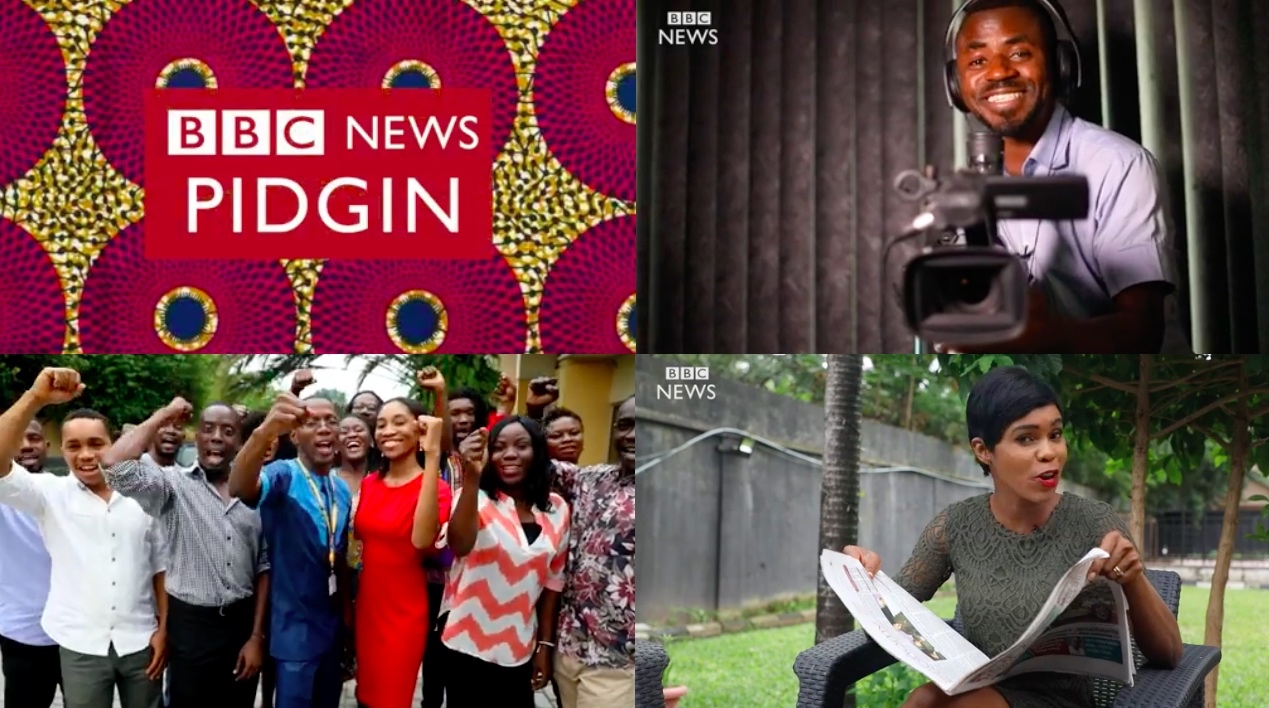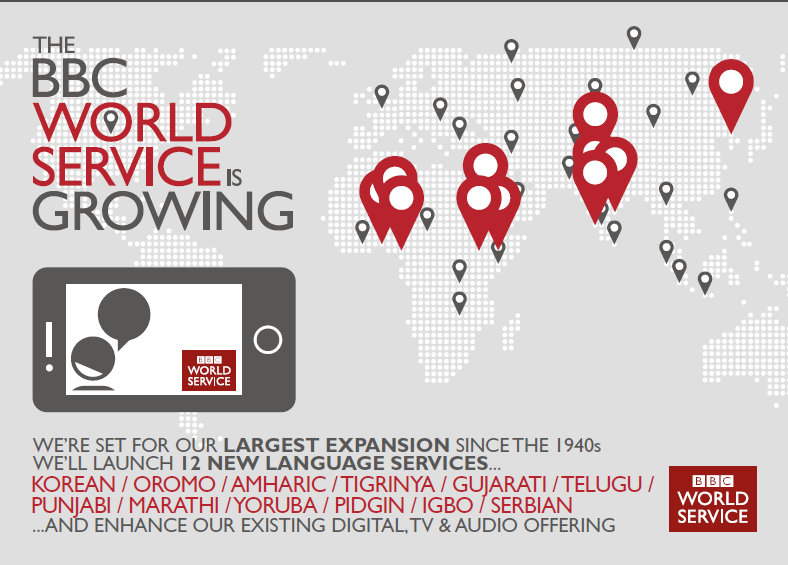
The BBC World Service already publishes in 28 languages around the world. On Monday, it makes a foray into unusual territory: launching a full-fledged news service delivered in Nigerian Pidgin, a largely oral language spoken widely both in Nigeria and in countries across West and Central Africa.
“Whenever you talk to people about the BBC doing a Pidgin service, they think it’s a joke — Pidgin is a humorous language spoken across many borders, with many variations. It’s a language we communicate and joke with,” said digital lead for BBC Africa Miriam Quansah when she, Solomon Mugera, Nairobi-based regional editor for BBC Africa, and I spoke ahead of Monday’s official launch. “It’s spoken by so many people, but nobody ever thought an international broadcaster based in the U.K. would be prepared to offer news content in it.”
The Pidgin service is the first of 12 new language services the BBC plans to launch into late 2018, as part of a £289 million investment announced last November that will also go into bulking up existing language services with new digital formats, increased TV programming, and more overall original reporting, and lead to more than 1,300 new staff. After the expansion, teams in Asia will make up roughly half the BBC World Service workforce: India alone is getting four new language services (Gujarati, Telugu, Marathi, and Punjabi). Its Korean language service will cater to South Korea as well as some listeners in North Korea. In addition to Pidgin, BBC is adding Afaan Oromo, Amharic, Tigrinya, Igbo, and Yoruba in Africa. Later next year, it will offer Serbian as well. The ultimate goal: to double the BBC’s current worldwide reach to 500 million people by 2022.
Its value is in part this international purview.
“Now, with the proliferation of news sources around the world — we are witnessing a huge mobile revolution especially in Africa, India, and Asia — it would be presumptuous to think that people would suddenly come to our websites just because we’ve launched them,” Shishkin said. “We are not coming in to be another provider of local news, though of course we will always be contextualizing what is happening inside the country. We are bringing another angle into this: We are bringing the world to that particular country where we operate, but we also explain the events there to the rest of the world.”
Shishkin is responsible for figuring out how to allocate 319 new digital, editorial hires, ranging from developers to social media editors to producers for new TV bulletins. Some of the roles are on individual language service teams. Others are regional-level roles — the BBC groups its language services into six regions — such as growth editors who can analyze data on story performance and make recommendations on how to improve coverage and increase reach. (I first heard Shishkin speak in depth about lessons learned on the digital side of the World Service’s expansion at this year’s Global Editors Network conference in Vienna. A useful summary is here, including the thinking behind the six “user needs” guiding BBC content.)
Broadly speaking, “every place we launch, we have launch editors — people who are responsible for getting the process going from the BBC point of view,” Shishkin told me. “Then you hire service editors for those particular teams, then you train them, then you have a few months for dry runs, then you launch.”
Every new language service requires its own justification, its own distribution strategy, and its own evaluation of the target audience’s needs. For many of these countries where the BBC plans to launch its new mobile-focused online news services, limited phone data is an issue, Mugera and Quansah said — newsrooms need to be ruthless about making sure all the video they produce are really worth the cost of a download. Amharic, Afaan Oromo, and Tigrinya will launch online in September with their own Facebook pages, for instance, then add news programming for radio (plus a five-minute English-learning program). In locations like Eritrea, where most people have limited internet connectivity and access to few news resources beyond a state broadcaster, social media can be “the only way for people to express themselves,” Mugera said.
Locally staffed and with the spoken nature of the language in mind, BBC Pidgin’s offerings include minute-long audio news updates and daily news videos. The stories already represent a carefully honed combination: Nigeria-specific stories, stories from the wider region, and tailored translations of global news, spanning straight news, explainers, inspirational features, and shareable quick hits (pre-launch, the team was able to collect feedback from places like universities in Nigeria and Ghana and Cameroon).
Brilliant! What a great @bbcnewspidgin team! Make Dem Hear! https://t.co/WYChutJPIo
— Solomon Mugera (@smugera) August 20, 2017
Partnerships with other news organizations are on the table, according to Quansah. “Despite everything we are doing, there will be gaps where we can’t go, or we may not reach a certain section of a target group, and we may find that there are smaller organizations that naturally speak that language.”
The BBC already has an established workflow that facilitates sharing text and video content among its own language services. It’s also developed new tools to ease cross-language sharing, such as this one that automates translations for videos.
“It wasn’t only about launching the new teams itself — it was about looking at the way the BBC operates digitally across all languages,” Shishkin said. “A huge amount of investment is also going into existing languages to prop them up with specific digital knowledge and expertise — be it digital video, social media, data, or any other specific skills…The way we are launching new services impacts in a very big editorial way how we’re running existing ones.”
The World Service is changing up how interactives will be produced. Regions will get their own dedicated interactives teams, so instead of pitching ideas to London, they’ll work with their own local teams. A newly formed “digital innovation hub” in Lagos, for instance, will include everyone from interactive designers to data journalists to social media specialists, so “for the first time we will have teams leading their own visual journalism projects,” Quansah said.
In recruiting local teams for its new African language services, the BBC realized seeking someone with several years of professional experience in journalism, who spoke the languages they needed, plus had a digital background, was difficult, Quansah said. It’s also hoping to reach younger audiences in Africa, and more women — which means recruiting more women to its newsrooms by “getting rid of barriers people may have in their heads” that digital journalism is a male-dominated field, and positioning itself as an employer that understands the nuances of local culture.
“We decided to look for people who have professional and personal experiences. This allows people to understand the market, because they are the market,” she said. “They may not have had a professional opportunity to be producing social media content, to be doing Facebook Live, Instagram Stories, or Snapchat for a media outlet, or even for a professional company.”
The BBC has also held several hackathons across Africa that have led to implemented pilot projects, and also to local developers joining the BBC’s product development process.
“Our experience running hackathons in Africa made it possible for the BBC to be confident in the quality of local development,” Shishkin said. “We have moved on from asking local players to build standalone products to actually partnering with local teams to contribute to the proper BBC product roadmap.”
“We are operating in these areas experiencing incredible mobile and social growth, so things like [Facebook] Instant Articles, Google Accelerated Mobile Pages, and light apps for audio listening, all of those things are very much in our plans,” Shishkin said. “Some of those things have been delivered, some of things are being delivered.” The next hackathon, he hinted, will be taking place in India (topic still to be defined).